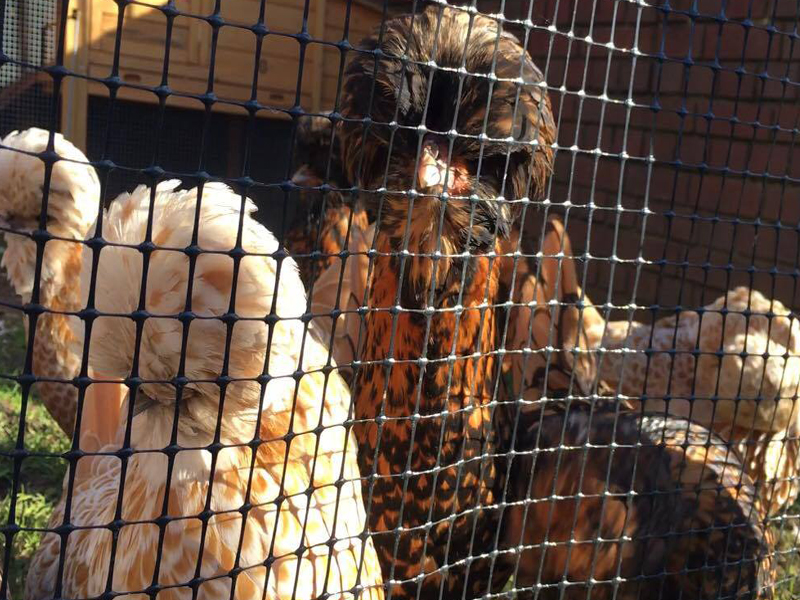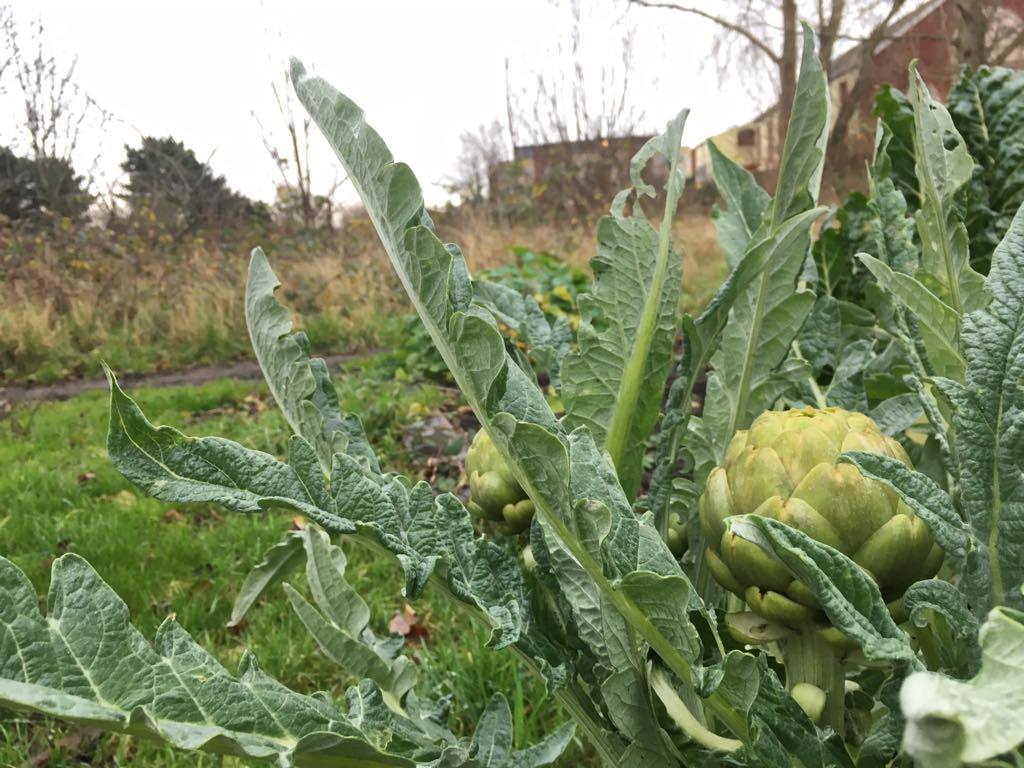Creating social communities
Quick Q&A Global Gardens:

As Poppy Nicol, co-founder of Global Gardens Project, gathers gardening tools for her Kurdish, Iranian, Japanese, English and Chinese volunteers, who chat casually with their hands in the earth, the social aspect of community gardening becomes incredibly clear. The strive to create something wholesome, edible, with common purpose and meet new people who you wouldn’t otherwise, is invigorating.
What are the aims of Global Gardens?
“Poppy Nicol said: “Global Gardens is about bringing the community together through shared activities, gardening, growing, cooking, and eating. We work with the Trinity Centre, which is a space for refugees and asylum seekers. We’re about cultivating common ground and celebrating cultural and ecological diversity.
How people we get involved?
“From 2-4pm every Saturday we’re at the Flaxland Allotment Site, just off Whitchurch Road on Sachville Avenue, Cardiff.
“We also run a cafe event at the Embassy Cafe in Cathays. Everyone is invited, even if you’re aren’t necessarily into gardening, you can still be involved.”
How do you think Welsh food system can be improved?
“I think the whole agenda for increasing production is great, and Food Cardiff do a lot of great work, it’s really nice to have this network of food initiatives in Cardiff. Everyone knows each other. But one thing i’m really passionate about it organic production. I think we need more political support for organic production.”
Cardiff’s urban gardening initiatives promote sustainable food, but to what extent are they solving Cardiff’s fruit & veg deficit?

The Pentrebane Zone’s unlikely pineapple
An unlikely pineapple is blooming in a deprived council estate in Wales. And dwarfed beneath concrete tower blocks, curious chickens strut in a courtyard. Even long earthy beds are dug into the grassy slopes outside, and an indiscernible array of edible greenery adornes their backyard.
This is the Pentrebane Zone – a living, growing, jem of a community centre. Through providing food five days a week to local people in need, the Zone’s volunteers became officially recognised in 2017 by the national charity, Cynnal Cymru – Sustain Wales, for their contribution in making Wales a sustainable food world leader.
The Pentrebane Zone is a testament to what volunteers engaged in hyper-local food growing can achieve. But they are just one of many organisations in a Cardiffian network attempting to address a serious, and extremely large, Welsh sustainable food issue.
Concerns that Wales can’t sustainably grow its own fruit & veg are increasing post-Brexit, while the population struggles to consume even their daily recommended five-a-day.
According to the doctoral research of Amber Wheeler, food secretary & sustainability consultant and PhD student at the University of South Wales:
– The UK currently imports more fruits & vegetables per year than any other type of food.
– Out of total 5.6m T of trade, 2.9m are from the EU [European Fresh Produce Association].
– Only 0.1% of Welsh agricultural land is currently producing fruit & vegetables [Welsh Government 2015].
– 32% of people in Wales eat their five-a-day recommended allowance, intrinsically linked to 57% of adults and 26% of children being overweight.

The Pentrebane Zone’s curious chickens
Significant Steps
Thankfully, progress in securing sustainable food for Cardiff is already being made, with the Welsh capital being awarded a Bronze Sustainable Food City Status in 2015.
The status specifically recognises the work of Food Cardiff, a powerful collaboration between Welsh Government, Cardiff Council, local businesses, charities and third sector partners who deliver projects across the city to address obesity, food poverty, food sustainability, environmental issues, and social disengagement.
An apple a day
One radical urban-growing initiative born out of Food Cardiff, the Apple a Day campaign, is aiming to aid the sustainable fruit shortage while encouraging consumption. The campaign estimates that 14,000 heritage fruit trees need to be planted across the city to provide an apple a day for every citizen.
But the aims of the campaign go beyond urban gowing for a healthier diet. Sam Holt, age 35, of Eggseeds [part of Cardiff Food Council and key partner in the campaign] describes the economic and social ripple that such an initiative could have on Cardiff’s communities.
“It’s not just about planting trees and getting funding, that’s easy”
It’s not just about planting trees and getting funding, that’s easy. We need to make sure skilled people are employed to look after them as part of maintenance teams, to make cuttings and grow more stock. We need to put that process into an educational system and potentially through career pathways.”
And although it’s not currently embedded in the mainstream curriculum, Cardiff’s children are being introduced to a sustainable food education. In 2017 Food Cardiff ran a pilot school summer program called Food and Fun. The scheme aim to aid the 44,000 children in Cardiff who can’t access free school meals during the summer holidays. Children received healthy meals, engaged in nutrition skills education, community gardening and love-food-hate-waste workshops.

Global Garden’s budding Artichokes
Just part of the solution
Cardiff’s sustainable food initiatives and community gardens can build communities, be educational, transformative and lifelines for people in need – such in the case of the Pentrebane Zone, Food & Fun and Global Gardens [see sidebar]. But they are very small part of the solution in getting access to sustainable and healthy food in Cardiff.
Amber Wheeler’s research is currently the only assessment of fruits and veg in terms of production and availability compared to public health requirements of the population. In her research Amber suggests systemic change is needed within the food industry for sustainability, feeding into all aspects of consumer demand, farming, production and so on.
Amber suggests that further assessment is needed so that national aims can be set, to be tackled by a national food organisation, which Wales currently lacks. “Without these steps, progress is likely to be slow and disjointed,” Amber states.
But one landmark campaign, Peas Please, headed by Amber Wheeler, Food Cardiff, The Food Foundation and additional partners has already begun to influence this systemic change.
In October 2017 the Peas Please campaign held Vegetable Summits in Cardiff London and Edinburgh, which saw retailers, food producers, manufacturers, catering companies and governmental departments pledging to improve the accessibility of vegetables throughout Wales and beyond. The pledges made by the summit’s participants is a significant first step in altering the severity of Wales sustainable food deficit, and is a huge achievement for gardening communities working as part of Food Cardiff.
On the Peas Please campaign web page Emma Williams, Federation of City Farms and community gardens Wales manager said: “At a time when access to quality, healthy, nutritious food is already limited, post Brexit, the importance of reconnecting consumers and producers through community food growing will be increasingly significant.
“If we’re serious about tackling issues of food poverty, obesity and falling levels of health and well-being in Wales we need to make sure that we have a food system that has people and communities at its centre.”

Seedlings inside Global Garden’s greenhouse
Creating social communities
Quick Q&A Global Gardens:

As Poppy Nicol, co-founder of Global Gardens Project, gathers gardening tools for her Kurdish, Iranian, Japanese, English and Chinese volunteers, who chat casually with their hands in the earth, the social aspect of community gardening becomes incredibly clear. The strive to create something wholesome, edible, with common purpose and meet new people who you wouldn’t otherwise, is invigorating.
What are the aims of Global Gardens?
“Poppy Nicol said: “Global Gardens is about bringing the community together through shared activities, gardening, growing, cooking, and eating. We work with the Trinity Centre, which is a space for refugees and asylum seekers. We’re about cultivating common ground and celebrating cultural and ecological diversity.
How people we get involved?
“From 2-4pm every Saturday we’re at the Flaxland Allotment Site, just off Whitchurch Road on Sachville Avenue, Cardiff.
“We also run a cafe event at the Embassy Cafe in Cathays. Everyone is invited, even if you’re aren’t necessarily into gardening, you can still be involved.”
How do you think Welsh food system can be improved?
“I think the whole agenda for increasing production is great, and Food Cardiff do a lot of great work, it’s really nice to have this network of food initiatives in Cardiff. Everyone knows each other. But one thing i’m really passionate about it organic production. I think we need more political support for organic production.”

